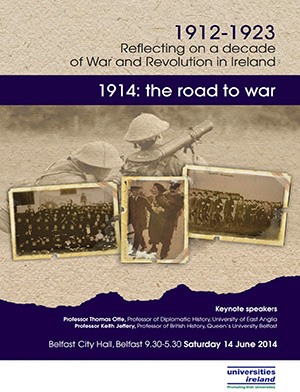
We attended the Universities of Ireland event at Belfast City Hall on Saturday. The organising team had pulled together a broad and illustrious range of speakers who provided engaging and thought provoking commentary on both the outbreak of war and the lessons which can be learnt from the first truly world war. The programme of the conference can be accessed here and the Universities of Ireland webpage may place some audio files on their site in the coming days.
Professor Eunan O'Halpin opened by stressing that whilst there are a wealth of projects involved in commemorating the Great War, they serve to engage all citizens in sharing their views and memories, broadening the impact beyond academic circles, something which the Living Legacies centre is keen to do in the next 3 years.
In the first keynote address of the day, Professor Thomas Otte offered his analysis on why war broke out, citing a lack of centralised policy in Berlin, coupled with an Austrian desire to stymie what they saw as aggressive Serbian nationalism.
Professor Keith Jeffrey stressed the scale of the voluntary Irish response to the crisis, noting that between 25 and 33% of Irish men aged 15-35 were mobilised; an incredible figure for a country which did not rely on conscription. He also noted that in 1914 Ireland was politically united by the war effort. He concluded by reminding the audience not to forget the violence of the conflict, adding that war is not just about collective heroism, but also about the deliberate, orderly taking of life.
Centre member Professor Richard Grayson discussed the importance of challenging accepted narratives of Irish involvement in the war, notably that it was a mainly Protestant, Unionist effort. He also emphasised the potential for tracing social histories which is afforded by the numerous projects which seek to digitise and share military records, medals and diaries.
Dr Fearghal McGarry of QUB spoke about the benefits of digitising sources, noting that the internet has democratised primary research; it is no longer the sole domain of academia, community historians can access resources and create new knowledge.
Towards the end of the conference, a member of the audience spoke up to challenge Dr Catriona Pennell's claim that there was a great deal of voluntarism in Ireland at the outbreak of war. She cited her aunt's experience of recruiting sergeants queuing at dance halls to coerce young men into joining. Dr Pennell accepted this as one of many experiences of Ireland in the war.
This insight is something which highlights the benefits of linking community and academic research; untold stories will be drawn into the public sphere and conventional narratives will be challenged.
